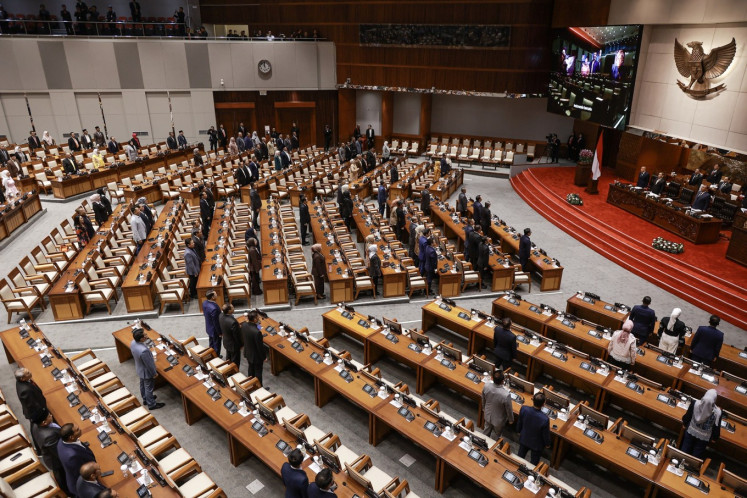Popular Reads
Top Results
Can't find what you're looking for?
View all search resultsPopular Reads
Top Results
Can't find what you're looking for?
View all search resultsAlexis denies claims, challenges shutdown
Party’s over: Workers cover the exterior signage of Alexis Hotel in North Jakarta on Tuesday
Change text size
Gift Premium Articles
to Anyone
P
span class="caption">Party’s over: Workers cover the exterior signage of Alexis Hotel in North Jakarta on Tuesday. The Jakarta administration has rejected the hotel’s application for a renewal of its business license, leading to the closure of its accommodation and massage services.(JP/Dhoni Setiawan)
While abiding by the Jakarta administration’s order to cease operations, Alexis Group demanded on Tuesday an explanation from Governor Anies Baswedan for the closure of its business, which has contributed tens of billions of rupiah in taxes to the city.
Alexis, a popular high-class entertainment center that operated as a hotel and massage parlor, was forced to shut its doors on Tuesday following the administration’s move not to extend its business permit, which expired in August.
On Tuesday the logo on the façade of the building was covered by black sheeting while a notice stating “Alexis hotel and spa is not in operation until further notice” was placed near the visitors’ entrance.
The closure of the premises, which had been popular for its “Bath House and Gentlemen’s Spa” on the seventh floor of the hotel, had been expected ever since Anies, whose election to City Hall was supported by conservative Muslim groups, had pledged to do so during his campaign earlier this year.
With three pools, a lounge and private spa rooms, the floor was rumored to host prostitution activities.
The administration has yet to produce evidence to back the closure.
Nevertheless, it claimed that the alleged prostitution had been reported in the mass media, and it had a solid basis for terminating the business permit.
During a press conference at the closed hotel restaurant on Tuesday, the management of the hotel said it had stopped all activities to comply with the administration’s order.
However, the group still demanded an explanation from the administration since it had operated legally for years.
“Alexis hotel and massage parlor is an entertainment hub that obtained all required permits and carried out activities in accordance with the prevailing regulations,” said Lina Novita, a legal and corporate affairs official of Alexis Group.
“No violations of the law, in the form of drug distribution or indecency, were ever found in the hotel or parlor,” she said.
Lina said that if the place had hosted prostitution as accused, it would have received warnings from the administration a long time ago.
Another management representative, Mochamad Fadjri, said the administration never conducted field monitoring in the hotel before deciding to terminate the operational permit of Alexis.
Lina said it was trying to contact the administration to find out about its violations, and is considering filing a lawsuit with the Jakarta State Administrative Court (PTUN Jakarta) should the administration fail to show solid grounds for the hotel’s closure.
The company, she said, also routinely paid about Rp 30 billion (US$ 2.2 million) in taxes per year for its entertainment business.
Jakarta One-Stop Integrated Service (PTSP) Agency head Edy Junaedi said there was nothing more that the company could do for its business license because the city had sufficient evidence proving that the hotel and massage parlor provided in prostitution services. But he refused to elaborate on the evidence.
During the gubernatorial campaign, Anies criticized his rival, then incumbent Basuki “Ahok” Tjahaja Purnama, for only acting firmly in evicting low-income residents, but not in curbing high-class prostitution. Ahok had earlier closed down Kalijodo, the city’s oldest red-light district, which was frequented by middle- and lower-income patrons, and turned it into a public park.
Ahok once said prostitution in hotels in Jakarta was common and called Alexis’ seventh floor “heaven on Earth.” But he did not act on the hotels because all were registered businesses.
Alexis’ closure has sparked uncertainty in the city’s entertainment industry as players are fearful that they might be the next target.
“Business owners are worried because there is no protection while doing business. The administration should’ve given us guidance and protection,” the deputy chairman of the Jakarta Entertainment Association (ASPHIJA), Gea Hermansyah, said.
The Jakarta Tax and Levy Board revealed in May that the hotel sector had contributed Rp 488 billion while the entertainment sector had produced Rp 251 billion this year.










